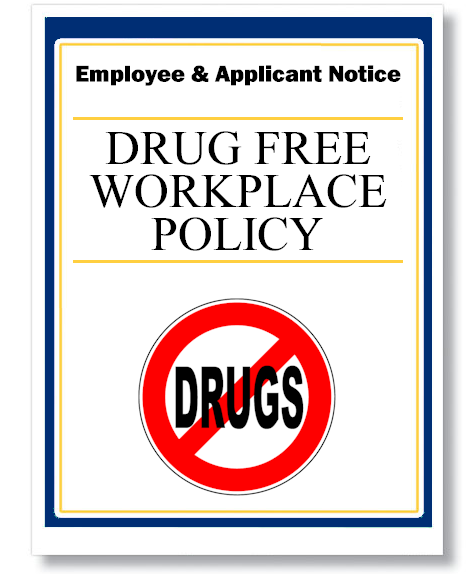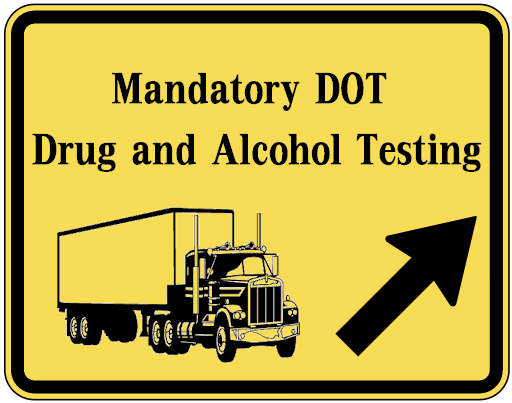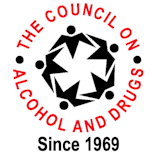- Home
- Uncategorized
Drug Testing Policy
 Each Company looking to start a Drug Free Workplace Program should begin with a formal written drug testing policy.
Each Company looking to start a Drug Free Workplace Program should begin with a formal written drug testing policy.
A Company’s drug testing policy should be as detailed as possible and meet all state and federal requirements that may apply to said business. The resources offered below are not all-inclusive but will help a business get started:
Q: Does your state require a notice to employees prior to conducting testing?
Q: Who will manage the policy, including the reporting of drug and alcohol testing results?
Q: What type of testing will be conducted?
• Random
• Reasonable suspicion
• Post-accident
• Return-to-duty
• Pre-employment
• Follow-up
Q: Who will be covered under the policy?
Q: How will your organization train your employees and supervisors?
Q: Will your company utilize a Medical Review Officer (MRO) to review positive tests?
Q: Will your company terminate or rehabilitate?
Q: How will you manage your random testing, including the frequency?
Don’t let the details bog you down. The Council on Alcohol and Drugs has a simple drug free workplace program available for you! Get your program started quickly:
There are many reasons why a company will consider becoming a drug free workplace. They could be required to become drug free due to federal funding or after a state contract is awarded. They could be interested in improving company safety. They could be simply looking to take advantage of a pro-employer law offered in their state which affords a favorable discount on workers’ compensation premiums. They could have a decision maker who was impacted personally by substance abuse who wants to make an impact at his/her organization. They could be considering the value associated with letting their customers, vendors and employees know that they are drug free to enhance sales and productivity. Whatever the reason for becoming drug free, every company should be applauded, in advance, for the impact they will have on their local community!
• If a local city made it a requirement for all new businesses applying for a business license to become drug free, in a short amount of time that city will see a reduction in crime and elevated community curb appeal. Until every city/town in the U.S. implements a drug free workplace requirement, each company needs to do their part to prevent substance abuse and this starts with a Drug Free Workplace Program. Commit to improving your community-become drug free today!
When designing your drug testing policy it is also important to include definitions that are specific to your organization.
What does your company consider an accident? What alcohol limit will your company consider detrimental? Are there any specific rules for employees who are “on call” after-hours? Is your policy clear in defining your company stance on prescription drug abuse, including using prescription drugs not prescribed to the individual using them? An employee needs to understand the consequences associated with taking a spouse or friend’s prescription drug-a drug that is not LEGALLY prescribed to that employee! Does your organization have any rules for an employee possessing drug paraphernalia on property? What happens if an employee refuses a test including not cooperating with the testing process? Does an employee have to report a drug or alcohol conviction while employed?
The above summary is meant to be thought provoking and is not meant to scare a company away from becoming drug free. The Council on Alcohol and Drugs is a 44 year old non-profit organization that prides itself on education, prevention and intervention programs. The Council is a highly sought after resource for managing a cost-effective drug free workplace and is here to help any company take the steps to become drug free. Let the Council help guide you and take advantage of the years of knowledge behind its Drug Free Workplace Membership Program.
The Council on Alcohol and Drugs Membership Program is the best resource for your company. Membership includes access to an online customer portal that includes all the tools needed to launch and maintain an effective drug free workplace. The membership portal is accessible 24 hours a day, 7 days a week.
Membership benefits include:
• Substance abuse policy
• Supervisor training
• Employee education
• State certification assistance
• Random pool management
• Drug testing kits
• Drug testing referrals for mobile and fixed facility collection sites, nationwide
• Online repository of vital forms required for compliance
• Multi-state options available
• Prevention provider assistance
• ADA compliance assistance
The Drug Free Workplace Team at the Council invites you to call upon us to help you make in impact on your community by becoming drug free. Our program is simple and cost-effective by design. Our goal is to impact as many communities in the U.S. by helping business become drug free!
Medical Marijuana an Emerging Challenge for Employers
New state laws are causing confusion among employees and job applicants and giving HR professionals headaches about what they can and cannot enforce. Some also worry that the state laws may make it more difficult to find future workers who meet their organizations’ drug-testing criteria. About 9 percent of the full-time, adult American workforce used illegal drugs at least once in the previous month, according to the results of the federal 2012 National Survey on Drug Use and Health. For young adults, the numbers are higher—double that for marijuana alone.
To date, the courts have weighed in on the side of employers’ right to test. After all, federal law still outlaws marijuana possession and use. “Our advice to employees is to stay the course with a comprehensive drug testing policy which is as detailed as possible and meets all state and federal requirements. Marijuana is illegal and employers have a duty to prevent marijuana use in the workplace.
Learn about modern Marijuana Potency
[video_youtube video_url=”https://www.youtube.com/watch?v=QWy-RkET9Co” width=”480″ height=”360″]Take the next step to becoming Drug Free NOW!
Fill out the form today and one of our Drug Free Workplace specialists will contact you to assist you with setting up your Drug Free Workplace program.
If you have an immediate question about implementing a Drug Testing Policy, please contact our dedicated Drug Free Workplace specialist.
Contact Us today at (404) 223-2481.
Training of Supervisors
 One of the main components of a strong Drug Free Workplace program is training of supervisors.
One of the main components of a strong Drug Free Workplace program is training of supervisors.
Whether you are a DOT regulated company or a company looking to take advantage of a state discount, you need to train your supervisors.
Federal regulations require FMCSA Supervisors to be trained for one hour on reasonable suspicion of drugs and one hour on reasonable suspicion for alcohol. Some states require Supervisors to be trained for two hours the first year and 1 hour each additional year and with state programs a Supervisor is also classified as an employee so that can double the training requirement!
Training options vary and each business needs to decide what method or combination of methods work best for them. Below are a few options for training of supervisors:
In-person/onsite training: This can be extremely beneficial however it normally comes with the high cost of a speaker as well as substantial loss in productivity for those having to attend the training.
In-person/offsite training: This has a similar scenario as noted above but you must also add the cost of traveling to the training location and the risk associated with having employees travel.
DVD training: This can be cost-effective however most employees don’t retain as much as they stop/start or don’t watch at all as a knowledge exam is normally not included.
Web based training: Depending on a company business model, this could be a viable option however, manufacturing, construction and similar business types have difficulty with this option due to unskilled workers not having access to a computer and the loss of productivity to pull somebody out of their job to take this course.
Webinar training: This can be a good option and if you have managers who can do a lunch/learn this is an option but it normally will not fit the need of all employees company-wide.
Monthly subscription/publications: This is a good way to stay current with new drugs such as synthetics or new rules and regulations with federally mandated programs.
Language options: Another item to consider is your workplace diversity. Do you need to communicate trainings in English and Spanish?
In addition to the method you choose for training of supervisors, you must also consider the topics. It is a Supervisor’s job to become familiar with the company policy so that they can enforce the policy. It is also a Supervisor’s job to understand how to document and protect the company in relation to reasonable suspicion cases. And of course they need “current” information to stay on top of today’s drug and alcohol problems that can cause issues within a work environment.
Below are some sample topics for trainings:
- Reasonable Suspicion
- The current status of Synthetic Drugs
- Marijuana legalization
- Drug testing options
- Common drugs of abuse
- How to become a certified drug free workplace
- Random Drug Testing 101
- Designated Employer Representative-DOT
- What you need to know about beating a drug test
- Signs and symptoms of drug and alcohol abuse
- ROI on a drug free workplace
- Drug testing and ADA
It is important to provide supervisors with current, up-to-date information in the most cost-effective manner that will allow for maximum retention of the information provided.
Training subscriptions are available through the Council.
Fill in the form below to receive a sample training of supervisors article.
If you have an immediate question about implementing Supervisor Training, please contact our dedicated training specialists.
Contact Us today at (404) 223-2481.
DOT Drug Testing
 Federal DOT Drug Testing & Alcohol Testing Regulations vary by transportation mode
Federal DOT Drug Testing & Alcohol Testing Regulations vary by transportation mode
Within the U.S. Department of Transportation (DOT), Federal DOT Drug Testing & Alcohol Testing Regulations vary by transportation mode. Safety-sensitive transportation employees in trucking, mass transit, rail, pipeline, coast guard, and aviation are subject to mandatory drug and alcohol testing to help ensure the safety of these employees and the general public. This site is dedicated to the rules, regulations and best practices associated with managing a Federal Motor Carrier Safety Administration (FMCSA) drug and alcohol compliance program.
All commercial licensed drivers (CDL) who meet the Commercial Motor Vehicle (CMV) definitions as defined in 49 CFR Part 382 and Part 40. Once a business determines their drivers fall under DOT requirements, the following testing must be implemented:
Types of DOT Drug Testing
:: Pre-employment DOT Drug Testing: A new driver must be drug tested with a negative result prior to operating a CMV on a public road. Alcohol testing is permitted only if it applies to all CDL drivers.
Any driver, who is removed from a random testing pool for more than 30 days, must submit to another pre-employment test.
:: Random DOT Drug Testing: CDL drivers are subject to unannounced random drug and alcohol testing. Each company must comply with the Random Testing Rates issued by the DOT for each year. Owner/Operators and small companies often join a consortium to meet random testing requirements.
Click Here to join The Council on Alcohol and Drug’s FMCSA Consortium.
:: Post-accident DOT Drug Testing: Drug and alcohol testing is required for accidents when a driver:
• is involved fatal accident (death)
• receives a traffic citation (ticket) and a vehicle is disable (tow)
• receives a traffic citation (ticket) and an injury requires treatment (ambulance)
Post-accident testing is subject to time constraints for both drugs and alcohol.
:: Reasonable suspicion DOT Drug Testing: Trained supervisors can direct a driver to be tested for drugs and/or alcohol whenever a driver exhibits the signs or symptoms of drug or alcohol abuse.
:: Return-to-duty: These tests require “direct observation” and are required only after an employee has completed the “return-to-duty” (RTD) process.
:: Follow-up DOT Drug Testing: A Substance Abuse Professional (SAP) will prescribe the frequency for each driver as part of the return-to-duty report. A minimum of six unannounced tests must be conducted during the first 12 months following RTD test. Follow-up testing is in addition to any random testing requirements.
Testing regulations apply to all CDL drivers including volunteers, part-time and owner/operators.
About The Council on Alcohol and Drugs & Drug Free Workplace Help
 The Council on Alcohol and Drugs has a long and robust history
The Council on Alcohol and Drugs has a long and robust history
Founded in 1969, The Council on Alcohol and Drugs has evolved into a national provider of drug and alcohol training and compliance services that feed the Council’s prevention and intervention programs and initiatives.
The Council’s services are broad based to ensure that the most lives can be impacted through education, public awareness campaigns, employer sponsored programs as well as media coverage. The Council has successfully provided alcohol, tobacco and other drug prevention services since its founding, and the agency has not lost sight of its original goal of bringing together all aspects of communities to combat substance abuse NATIONWIDE!
Meet Mr. Chuck Wade, President and CEO, of The Council on Alcohol and Drugs
Chuck has been a part of the Council for many years and has been fighting the war on drugs for more than 18yrs. He began his career as an under-cover narcotics officer and worked hard for many years recording several large drug busts.
However, despite all the efforts targeting the drug dealers and suppliers, Mr. Wade, moved forward to target a larger audience. Mr. Wade has been the State Director for Georgia’s successful Drugs Don’t Work Program for the past 18 years and is a well-respected speaker and industry expert. The Council is very fortunate to be led by a leader so rich in industry experience and passionate about the cause. Should you ever want to connect with Mr. Wade he can be reached at cwade@livedrugfree.org.
The team at The Council on Alcohol and Drugs looks forward to having the opportunity to support your company’s efforts in achieving and maintaining a comprehensive drug free workplace program.
Click here to meet the rest of The Council on Alcohol and Drugs team who is looking forward to working hard for you!
Home
|
|
The Basics of Getting Started as a Drug Free Workplace… |
|
|
|
|
Our Drug Free Workplace Programs are designed with Simplicity for Ease of Implementation |
| The 3 preliminary steps above may seem like a lot of work, however, The Council on Alcohol and Drugs is a 49 year old non-profit focused on helping businesses set up, maintain and certify their drug free workplace with the state(s) in which their business operates. – The Drug Free Workplace programs are designed with simplicity for ease of implementation and ongoing management. The affordable pricing structure makes it cost-effective for businesses of any size to become a Drug Free Workplace Member with The Council on Alcohol and Drugs. – The strategic design of our programs was established to ensure our non-profit could help thousands of businesses nationwide become drug free which in-turn attacks the drug epidemic our country is faced with by attacking the demand side of the problem. |
|
|
|
Your Drug Free Workplace Program has a Direct Community Impact |
| Drug Free Workplace membership dues help fund the Council’s drug prevention programs for children. – Click here for information on our substance abuse prevention initiatives. We thank you in advance for considering our Drug Free Workplace help, but if we are not a fit for your organization please consider making a business donation by clicking here. – Drug Free Workplace Programs are offered for Department of Transportation, Single State or Multiple States. Training is available in both English and Spanish and our training tools encourage little or no down time from workplace productivity. – This proven training method has been helping 20,000+ businesses educate their employees. As an added benefit to employees, training materials provided with a membership are easy to pass on to family, friends and loved ones outside of the workplace. Providing access to these materials each month adds another indirect layer to our prevention and education strategies. |
|
|
|
Our Experts are available and ready to help!A team of dedicated Drug Free Workplace and DOT Compliance Specialists are available and ready to help your company with taking the first step in becoming drug free. Contact us today directly (404) 223-2481 toll free via 1 (877) 714-5572 or by submitting your mobile phone number below and one of our experts will contact you directly. |

